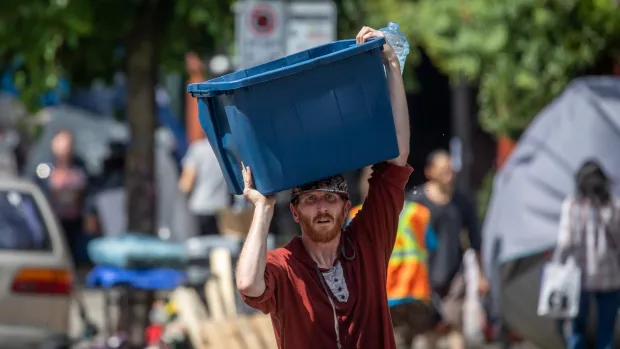Housing advocates say there is no plan from the city of Vancouver or the province of British Columbia to house over 400 people living in tents and makeshift shelters along the sidewalks of Hastings Street in the Downtown Eastside.
A day after city staff began the removal of tents along East Hastings street, most of the structures are still standing and those dwelling in them wonder where they’re supposed to go.
“The city has no options for them. They straight up have no units for anyone,” said Vince Tao with the Vancouver Area Network of Drug Users.
“There’s no plan to where people are supposed to disperse to survive. Yet the city is coming in anyway to just kick everyone out.”
The B.C. Human Rights Commissioner estimates 400 people live in tents along several blocks of East Hastings Street.
The city of Vancouver said the sidewalks are being cleared because of an order from the fire department citing fire hazards.
Advocacy group Pivot Legal Society said clearing the community will violate a pact signed by the city, the province and Vancouver’s park board to ensure supports for those without shelter.
In 2021, they signed a memorandum of understanding to end the homeless camp at Strathcona Park and prevent similar encampments in the future. The agreement included language specifying that removing encampments was contingent upon enough permanent and temporary housing being available for the park’s residents.
Shelter rights protected by Charter
Lawyer Alexander Kirby, who successfully represented encampment residents at Crab Park and in Prince George says there’s more at play than just the memorandum.
“The ability to shelter outside has been recognized by the courts as being protected by the charter,” he explained.

“The decision to evict someone who is sheltering in a public space out of necessity is one that engages fundamental questions of survival and human dignity and autonomy.”
Section 7 of the Canadian Charter of Rights and Freedoms states that “everyone has the right to life, liberty and security of the person and the right not to be deprived thereof except in accordance with the principles of fundamental justice.”.
Kirby says in deciding to remove tent encampments, it has a responsibility to consider where those displaced will go and what will happen to them.
“It can’t just do what it likes and wait for somebody to bring a challenge, because that is something that’s hard for anyone at the best of times, let alone people who are struggling to survive outside.”
No housing alternatives provided
The City of Vancouver says finding people homes is B.C. Housing’s job.
B.C. Housing says not enough housing is available for all the people living on the street on such short notice.
An update from the city on Wednesday said a big contingent of police at the Main and Hastings intersection in the afternoon “was not as a result of the City’s effort to remove structures,” and instead stemmed from an incident Tuesday when a brawl broke out between residents and police outside the community centre at that location.
The city said staff aimed to approach encampment residents “with respect and sensitivity, encouraging and supporting voluntary removal of tents and belongings through conversation” but it couldn’t ignore the significant safety risks to the neighbourhood.
Staff spent Wednesday telling residents about storage options for their belongings, the city said.
Tao was on Hastings Street Tuesday as people were told to pack up their belongings. He says none of them were offered housing alternatives.
“B.C. Housing was not on the scene. No one was asking people, ‘Hey, do you want to get into housing?'”

He questions why the vacant Regent and Balmoral hotels — owned by the city — haven’t been renovated and repurposed to provide housing.
Earlier this year, the City of Vancouver announced that the Balmoral hotel would be demolished over a period of several months due to serious health and safety concerns throughout the building.


